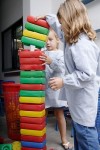Clear and accurate oral expression by children validates their learning
Learning must take place in a community of learners where thoughts are clarified and exchanged through verbal interactions with teachers and peers that are more competent. The language of children symbolically represents what they are experiencing and understanding. Clear and accurate oral expression by children validates their learning. Play provides dynamic opportunities not only to demonstrate and practice new concepts and vocabulary but also to develop social skills. Thus a well-designed playground and classroom activity centers are comparable well-equipped high school science labs.
Moral Instructions
Respecting the teacher and obeying his and her rules contributes to children’s moral growth
Young children need to learn to respect (honour) and obey in order to grow Christlikeness (Ephesians 6:1-3), and for the non-Christians, in order for the children to grow in a noble way. All learning takes discipline, and the will and attitudes are influenced early in life (Proverbs 22:6). Children must learn rules of conduct and the behaviours that are appropriate in school. “The child’s respect for [parental] authority is the single most important moral legacy that comes out of the child’s relations with the parent” (Damon, 1988). The teacher’s authority and the school’s rules of conduct are likewise essential to the classroom’s functioning. Thus, respecting the teacher and obeying his and her rules contributes to children’s moral growth. Educators must therefore view time spent in teaching behavioural expectations and responding to children’s inappropriate behaviour as integral to, as opposed to a distraction from, the curriculum.
Reference:
Damon, W. (1988). The Moral Child: Nurturing Children’s Natural Moral Growth. New York: Free Press.








